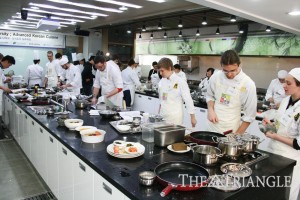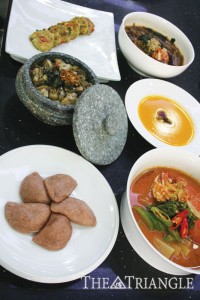Assistant Professor of Hospitality Management, Culinary Arts and Food Science Jeehyun Lee and the 15 students enrolled in her Advanced Korean Cuisine class visited South Korea March 12–26 to learn more about the country and its cuisine.

The South Korean government also provides funds for the Korean Cuisine courses at Drexel, according to Lee. The South Korean company Sempio Foods contributes certain supplies for the class, as well.
This current term marks the first time Drexel is offering an Advanced Korean Cuisine class. Drexel is currently the only university in the United States to offer such a course, according to Lee.
The class trip to South Korea included eight cooking classes for the students at four different locations. Lee said these classes helped the students “learn how Korean cuisine could be different from location to location.”
Lee said Drexel’s cooking facilities compared favorably to those the class visited in South Korea, partly because of differences in the South Korean cooking facilities such as a lack of hot water for cleaning dishes.

According to Lee, the main objectives of the cooking classes in South Korea included teaching the students new recipes and allowing them to try different foods. After completing the classes, the students hosted an event in Seoul, South Korea, where they cooked for visitors, including their cooking class teachers, workers from the sponsoring South Korean government agencies, workers from Sempio Foods and others.
Also during the trip, students visited a tea farm, the Baesangmyeon Brewery, a farm where pepper paste and fermented soy products are made and a fish market, in addition to grocery stores and restaurants.
Lee and her students were also featured in many media stories while in South Korea. The class was recognized in television stories, including one on Arirang TV, a national network that focuses on items broadcast in both Korean and English, and one on the Korean Broadcast System’s national 9 a.m. news. The group was also featured in over 100 news stories in newspapers and magazines, and Lee was twice interviewed on the radio.
During the trip the students visited other Korean sites, including the Demilitarized Zone between North and South Korea. Some students visited the joint security area located directly next to North Korea, as well. Lee said students told her they found the experience intense. She added that the students were able “to realize what it is [for] one country to be separated into two.”
The group also visited Dorasan Station, an empty train station that serves as a symbol of a place from which a train could travel from South Korea to North Korea, then through the rest of Asia and Europe, if the border between North and South Korea were open.
In addition, the group went to Haeinsa Buddhist Temple on the day of the spring equinox. Lee said that if the sky is clear during an equinox, the temple’s shadow forms the shape of a lotus flower. However, it was cloudy at the temple when Lee and her students were there, so they were not able to see the shape.
Other sites the group toured included the Blue House, the home of South Korea’s president.
Lee said the most rewarding part of the trip for her occurred when she and her students visited her mother, a food science professor at a South Korean university. Lee said she had planned to purchase a present for her mother, but the class insisted on buying the present and presented it to Lee’s mother themselves. Lee said this “was something I never expected.”
Lee, who is South Korean, said the trip was her first to South Korea with Drexel students. She added that the students seemed to enjoy the trip and learn a great deal about Korean cuisine.
“They knew a lot more about Korea and Korean cuisine. A lot more than you can teach in an entire term,” Lee said.
Students in the Advanced Korean Cuisine class will host presentations on the trip and help run a Korean food tasting May 13 at the Academic Bistro.
Lee said students have been struck by Korean cuisine’s time-consuming nature, unusual cooking procedures, and strong emphasis on appearance. In Korean cuisine, there are five colors that are supposed to be included in each dish, and each ingredient is supposed to maintain its own flavor rather than being mixed with others. Korean food also has a heavy focus on fermented foods such as vegetables, according to Lee.
Drexel is holding an Advanced Korean Cuisine course in part because of students’ interest in learning more about the cuisine after completing the basic Korean Cuisine class during fall term, Lee said.
Lee added that she hopes to run a trip to South Korea again, though she does not know whether the South Korean government would support it to the same extent. She added that Drexel is the first school to participate in the South Korean government’s program to globalize Korean cuisine.
According to Lee, the South Korean government has sponsored Drexel’s Korean Cuisine classes for three years and hopes the class eventually becomes a regular course rather than a special topics course. is hopeful that this change to a regular course could possibly occur.


